- Home
- Michael Byrnes
The Sacred Bones Page 2
The Sacred Bones Read online
Page 2
Another abrupt hand signal ushered his men onto the sloping walkway approaching Moors' Gate. To his left, he glimpsed the Western Wall Plaza nestled along the embankment's base. Yesterday he had marveled at the Orthodox Jews-- men separated from women by a curtained partition who gathered here to mourn the ancient temple they believed had once graced this holy place. On his right lay a small valley littered with excavated foundations-- Jerusalem's oldest ruins.
A substantial iron gate sealed with a deadbolt denied access to the platform. In less than fifteen seconds the lock had been picked and his team funneled through the tunneled entrance, fanning out across the broad esplanade beyond.
Slipping past the stout El-Aqsa Mosque abutting Temple Mount's southern wall, Conte turned his gaze to the esplanade's center where just over tall cypress trees, a second and much grander mosque stood on an elevated platform, its gilded cupola illuminated like a halo against the night sky. The Dome of the Rock-- embodiment of Islam's claim over the Holy Land.
Conte led the team to the esplanade's southeast corner where a wide opening accommodated a modern staircase, cascading downward. He splayed the fingers of his gloved right hand and four men disappeared below the surface. Then he signaled the remaining two men to hunker down in the nearby tree shadows to secure a perimeter.
The air in the passage became moist the further the men descended, then abruptly cold, giving off a mossy aroma. Once they had assembled at the base of the steps, rifle-mounted halogen lights were switched on. Crisp, luminous beams bisected the darkness to reveal a cavernous, vaulted space with arched stanchions laid out on neat avenues.
Conte remembered reading that twelfth-century Crusaders had used this subterranean room as a horse stable. The Muslims, its latest occupants, had recently converted it into a mosque, but the Islamic decor did little to mask its uncanny resemblance to a subway station.
Running his light along the room's eastern wall, he was pleased to spot the two brown canvas bags his local contact had promised. "Gretner," he addressed the thirty-five-year-old explosives expert from Vienna. "Those are for you."
The Austrian retrieved them.
Slinging his carbine over his shoulder, Conte took a folded paper from his pocket and switched on a penlight. The map showed the exact location of what they'd been charged to procure-- he didn't favor references to "stealing"-- the term demeaned his professionalism. He aimed the penlight along the wall.
"Should be just ahead." Conte's English was surprisingly good. To keep communications consistent and less suspicious to local Israelis, he had insisted that the team converse only in English.
Securing the penlight between his teeth, he used a free hand to unclip the Stanley Tru-Laser electronic measuring device from his belt and punched a button on its keypad. A small LCD came to life, activating a thin red laser that cut deep into the darkness. Conte began to move forward, his team trailing closely behind.
He continued diagonally through the chamber, weaving between the thick columns. Deep into the space Conte abruptly stopped, verified the measurements on the LCD and swung the laser till it found the mosque's southern wall. Then he turned to face the northern wall, the gut of the Temple Mount.
"What we're looking for should be just behind there."
2.
Salvatore Conte rapped a gloved hand on the wall's limestone brickwork. "What do you think?"
Setting down the canvas bags, Klaus Gretner unclipped a portable ultrasound device from his belt and held it over the wall to gauge density. Seconds later the result appeared on the unit's display. "About half a meter."
From the first bag, Conte pulled a sizeable handheld coring drill-- the Flex BHI 822 VR model he'd specified-- the chuck already fitted with an eighty-two millimeter diamond drum-bit. Glinting beneath his penlight, it looked like it had just come out of its box. He passed it to Gretner. "You should have no problem dry-cutting it with that. Plenty of outlets along the wall there," he said, pointing. "The extension cord and adapter are in the bag. How many cores you going with?"
"The stone's soft. Six should do it."
From the second bag, Conte took out the first brick of C-4 and began molding the gray putty-like explosive into cylinders while the Austrian drilled into the wall's mortar seams.
Ten minutes later, six neat cores were packed and plugged with remote detonating caps.
Wiping down the drill, Gretner discarded the Flex by the wall. Then he and Conte took cover with the others behind the columns, covering their faces with respirators. Using a handheld transmitter, Gretner triggered a coordinated detonation.
The ear-numbing blast was immediately followed by a rush of debris and billowing dust.
After pulling away some more loose bricks to widen the blast hole, Conte climbed through the gaping opening, followed by the others.
They found themselves inside another chamber, its details obscured by the clouds of dust. Stout earthen pillars could be made out supporting the low ceiling. Even with respirators, the air was thin and difficult to inhale, tinged with the lingering fumes of cyclotrimethylene, which smelled like motor oil.
This place had obviously been sealed for a long, long time, Conte thought and for a brief moment he wondered how his client could have possibly known it even existed. He turned sharply to the man next to him. "Give me some light."
Moving forward into the gloom, the lights played across a row of ten rectangular forms resting on the floor against the chamber's side wall. Each was about two-thirds of a meter in length, cream-colored, and slightly tapered from top to bottom.
Perusing the inventory Conte paused over one at the end of the row, kneeling down to get a better look. Choosing the correct one was much easier than he'd have thought. Unlike all the others, this was covered in ornate, etched designs. Tipping his head to view the left side of the box, he compared the distinctive carved symbol to the image on a photocopy he pulled from his pocket. A perfect match.
"This is it," he announced to the others, pocketing the papers. "Let's keep moving." Though they were deep beneath the Temple Mount, Conte knew that the sound of the explosions would have been heard beyond the outer walls.
Gretner stepped forward. "Looks heavy."
"Should be about thirty-three kilos." Somehow, his client knew that as well. Rising up, he stepped aside.
Slinging his XM8, Gretner laid a web of nylon strapping on the floor. He and another man lifted the box onto the webbing, hoisting it off the floor.
"Let's get out of here." Conte waved the team forward.
They worked their way through the blast hole and back into the mosque. Before ascending the staircase Conte collected their respirators, stuffing them into his bag.
Emerging onto the esplanade, Conte scanned the area intently and verified that his two sentries remained posted securely in the shadows. He signaled to them and both men sprinted ahead.
The rest of the team assembled on the esplanade.
Moments later, when the sentries' silhouettes swept across the opening of Moors' Gate, they were instantly forced back by automatic gunfire emanating from the plaza below.
A pocket of quiet.
Distant screams, then more shots.
Motioning for the others to remain, Conte ran over to the gate, dropping onto his elbows as he neared the opening. Peering out he saw Israeli soldiers and police swarming into the vicinity, blocking the walkways down by the Western Wall Plaza. Someone must have either found the two dead IDF soldiers or heard the detonation.
The Israelis were hunkered down, waiting for them to make a move. Other entrances provided access to Temple Mount and Conte rapidly considered a revised exit strategy, but he was certain the IDF would be sending reinforcements to those gates as well. It wouldn't be long before they scaled the platform.
He knew that using the rented van parked in the Kidron Valley was no longer an option. Turning back from the gateway, he signaled for the sentries to follow him back to the group.
As he ran by the El-Aqsa M
osque, Conte grabbed the encrypted radio transmitter from his belt. "Come in Alpha One. Over."
Nothing but static.
He moved away from the interfering mosque wall.
"Alpha One?"
Through the haze a choppy voice was just audible.
Conte cut in with the transmitter button. "If you can hear me, we've got a change of plan. We're under fire." Raising his voice, he carefully articulated his next command. "Pick us up on the southeast corner of the Temple Mount esplanade, beside the El-Aqsa Mosque. Over."
A pause.
More static.
"Roger. On my way," a faint voice crackled back. "Over."
Conte concealed his relief. Just over the jagged mountain range to the south he detected a dark shadow against the night sky.
The chopper was approaching rapidly.
He clicked his XM8 to fully automatic, activating the grenade launcher and the others did the same. Fearing they might inflict damage on this sacred place, he knew that the Israelis would be reluctant to fire heavily on them. But his team wouldn't be nearly as accommodating.
"We'll need to take those guys down to clear the area," Conte commanded. On his signal, the mercenaries rushed toward the gate in neat formation, carbines drawn.
The chopping sound of rotor blades now had the Israelis' attention, many gazing skywards at the black shadow gliding low and fast toward Temple Mount.
From their shadowed position high up on the retaining wall, Conte and his men sprayed the soldiers with a curtain of firepower. Within seconds, eight had fallen. Others were scurrying for cover in the open plaza below, while reinforcements spilled into the area from the network of narrow streets feeding in from the Jewish and Muslim Quarters.
The Israeli Air Force Black Hawk suddenly rose over the embankment's southeast corner, its profile decked out in desert camouflage temporarily confusing the IDF soldiers with its familiar markings. But Conte could also see a group of men maneuvering to better positions along the embankment's southwest corner. Immediately to his right, Doug Wilkinson, the assassin from Manchester, England, suddenly recoiled, clutching his upper arm, dropping his XM8.
Sliding his finger to the carbine's second trigger, Conte centered his sights on the cluster of soldiers below and fired. The grenade rocketed off its rifle mount streaming an arc of smoke and orange sparks until it exploded, hurling fragments of stone into the air. Other grenades followed with a fiery barrage of exploding stone and shrapnel that forced the Israelis back in chaos.
The rotor blades were close behind the team now, throwing up a dust storm. The Black Hawk bounced down on the platform, coming to rest beside the El-Aqsa Mosque.
"Go now!" he yelled, waving the team toward the chopper. "Get the cargo on board!"
Retreating from the gate, Conte spotted yet more IDF soldiers between the cypress trees on the opposite side of the Temple Mount, quickly closing in on the vicinity surrounding the Dome of the Rock platform.
It was going to be close, he thought.
The box was rapidly stowed in the chopper and then his men clambered aboard. He ducked under the rotor blades, jumping inside.
Under heavy gunfire, the Black Hawk lifted off the platform and tore away from Temple Mount. Hugging the Ha-Ela Valley floor, it swept across the barren expanse of the Negev Desert, heading southwest. The chopper's low flight path was well beneath radar range, but even at higher altitudes its state-of-the-art cloaking technology would render it virtually untraceable.
Within minutes the lights of the Palestinian settlements along the Gaza Strip came into view. Then Gaza's beaches rapidly gave way to the dark expanse of the Mediterranean.
Eighty kilometers off Israel's coast, a custom-built twenty-meter Hinckley motor yacht had been anchored at precise coordinates programmed into the flight console. The pilot maneuvered the Black Hawk over the yacht's aft deck, easing down to hover in the hold position.
The box was carefully lowered to the Hinckley's crew, then one by one the team rappelled down the line. Wilkinson tucked his wounded arm tightly to his side as Conte clipped him to the line. All things considered, the wound was relatively minor. When Wilkinson had made it on deck, Conte went next.
Setting the autopilot controls to hover, Conte's pilot evacuated the cockpit, stepping over the two dead Israeli pilots who earlier that evening had set out from Sde Dov airbase on a routine surveillance mission along the Egyptian border, blissfully unaware of their heavily armed replacement hidden in the rear.
With cargo and passengers secured, the Hinckley's engines fired up and the craft moved off, slowly gathering speed. Conte loaded another grenade and found the chopper fifty meters away. A split second later the latest state-of-the-art in American military technology ripped apart, lighting up the night sky in a flaming ball.
The yacht accelerated to its cruising speed of twenty-two knots and headed northwest across the Mediterranean's choppy waters.
There would be no more fighting that night. As Conte had anticipated, the Israelis had been totally unprepared for an orchestrated stealth attack. But the messy confrontation and high death toll meant his fee just went up.
MONDAY
THREE DAYS LATER
3.
TEL AVIV
As the El Al captain announced the flight's final descent into Ben Gurion International, Razak bin Ahmed bin al-Tahini gazed out of his window to watch the Mediterranean yielding to a desert landscape set against an azure sky.
Yesterday, he had received a disturbing phone call. No details had been provided, merely an urgent request from the Waqf-- the Muslim council that acted as the Temple Mount overseers-- summoning him to Jerusalem for assistance in a sensitive matter.
"Sir," a soft voice called to him.
He turned from the window to find a young flight attendant dressed in a navy suit and white blouse. Razak's eyes were drawn to the El Al insignia pin on her lapel-- a winged Star of David. "El Al" was Hebrew for "skyward." Yet another reminder that here, Israel controlled more than just the land.
"Please bring your seat to the upright position," she politely requested. "We'll be landing in a few minutes."
Raised in the Syrian capital of Damascus, Razak was the oldest of eight siblings. Growing up in a close-knit family, he frequently helped his mother shoulder household responsibilities since his father was an ambassador for the Syrian embassy and traveled endlessly. With his father's help, he had begun his political career as a liaison between rival Sunni and Shiite factions in Syria, then throughout the Arab region. After studying politics in London, he'd returned to the Middle East, where the scope of his duties had broadened to include diplomatic missions to the UN, and liaising between Arab and European business partners.
For almost a decade now, Razak had been intimately involved in Islam's most problematic issues, becoming a reluctant-- yet increasingly influential-- political figure. Faced with its maligned association to radical fanaticism and terrorist acts, and the neck-breaking onslaught of globalization, the sanctity of Islam in the modern world was increasingly difficult to preserve. And though Razak's aspiration in accepting his role was to focus on the religious aspects of Islam, he had quickly learned that its political components were inseparable.
And at forty-five, his responsibilities were showing. Premature gray streaks had sprouted from his temples, spreading through thick black hair, and a permanent heaviness showed under his dark, solemn eyes. Of medium height and build, Razak wasn't one to turn heads, though in many circles, his knack for diplomacy was sure to leave a lasting impression.
Substantial personal sacrifice had quickly transformed his youthful idealism into tempered cynicism. He constantly reminded himself of the wise words his father once told him when he was just a young boy: "The world is a very complicated thing, Razak, something which is not easily understood. But surviving out there"-- he had pointed somewhere far out into the distance-- "means never compromising your spirit, because no man or place can take that from you. It is Allah's m
ost precious gift to you,...and what you do with it is your gift to Him."
As the Boeing 767 touched down, Razak's thoughts shifted to the mysterious altercation in Jerusalem's Old City three days earlier. The worldwide media was circulating reports about a violent exchange that had taken place at Temple Mount on Friday. Though the nature of the altercation was still highly speculative, all accounts confirmed that thirteen Israeli Defense Force soldiers had been killed by an as-yet unknown enemy.
Razak knew it was no coincidence that his services were now required here.
As he retrieved his suitcase from the baggage claim carousel inside the terminal, his watch alarm beeped. He had programmed it to ring five times a day, and in five differing tones.
Two thirty.
After stopping in the men's room to ritually wash his face, hands, and neck, he found a clean spot along the concourse and set his bag down. Reexamining his watch, he referenced a miniature digital readout data-fed by a global positioning microchip. A small arrow shifted on the face pointing him in the direction of Mecca.
Raising his hands up, he declared "Allah Akbar" twice, then crossed his hands over his chest and began one of the quintet of daily prayers compulsory in Islamic faith.
"I bear witness that there is no God but Allah," he softly muttered, easing down on his knees then bowing in submission. In prayer he found a solitude that silenced the noise around him, reconciling the compromises he was asked to make in the name of Islam.
Deep in meditation, he blocked out the group of Western tourists scrutinizing him. To many in the modern world, devout adherence to prayer was a foreign concept. It didn't surprise him that the sight of an Arab man in a business suit kneeling in submission to an invisible presence so easily captured the curiosity of most non-Muslims. But Razak had long ago accepted the fact that piety was not always convenient or comfortable.

 The Sacred Bones
The Sacred Bones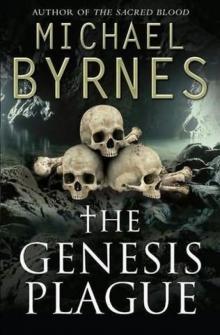 The Genesis Plague (2010)
The Genesis Plague (2010)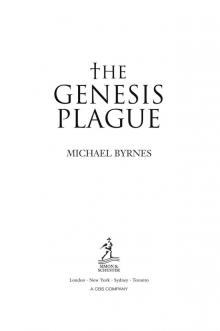 The Genesis Plague
The Genesis Plague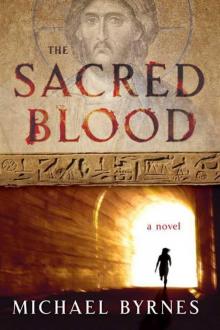 The Sacred Blood
The Sacred Blood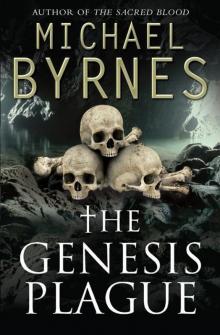 The Genesis Plague tf-1
The Genesis Plague tf-1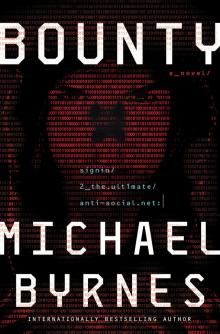 Bounty
Bounty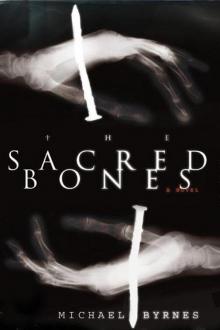 Sacred Bones : A Novel
Sacred Bones : A Novel